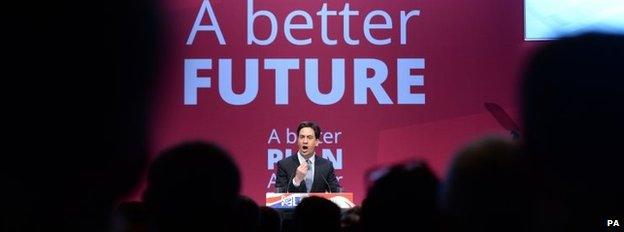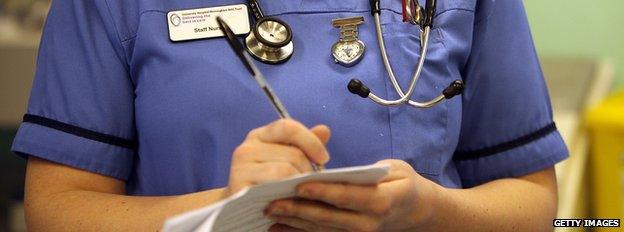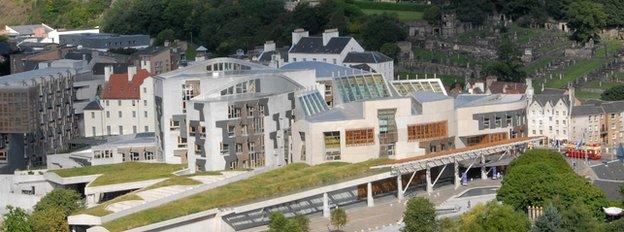Election 2015: Labour manifesto at-a-glance
- Published

Labour has launched its manifesto ahead of the general election. The full document is available online, external. Here are the main things you need to know.

Key message
The theme of Labour's manifesto is that "Britain only succeeds when working families succeed".
The party says every policy pledge in the document is funded and will be paid for without any additional borrowing.
It promises that if Labour is elected the opening line in its first Budget will be a pledge that it "cuts the deficit every year".

Key policies
Much of the document commits to policies already announced by the party such as a ban on some zero-hours contracts, a freeze on energy bills, scrapping non-dom tax status, reducing tuition fees to £6,000.
New pledges announced on Monday include:
Raising the minimum wage to more than £8 by October 2019
Freezing rail fares for one year
Protecting tax credits for working families so they rise with inflation
Introducing a new National Primary Childcare Service, guaranteeing childcare from 08:00 to 18:00
The manifesto also pledges there will be no increase to the basic or higher rates of income tax, National Insurance or VAT.

The economy

The deficit and how Labour intends to tackle it plays a central role in the economy section of the document. The party pledges to:
"Cut the deficit every year and balance the books as soon as possible in the next Parliament"
Bring back the 50p top income tax rate for those earning over £150,000
End the non-dom rule that allows some wealthy UK residents to limit the tax they pay on earnings outside the country
"Cut and then freeze" business rates
Guarantee an apprenticeship for all school leavers who attain certain grades and "require any firm that gets a large government contract to offer apprenticeships"
Ban zero-hours contracts deemed to be "exploitative"
Freeze energy bills until 2017 and give the regulator powers to cut bills
Introduce a British Investment Bank

Health and education

The second section of the document focuses on the NHS and education. Labour says it will:
Invest £2.5bn more than the Tories in health to recruit 8,000 more GPs, 20,000 more nurses and 3,000 more midwives
Guarantee GP appointments within 48 hours
Guarantee cancer tests within a week
Repeal the coalition's "privatisation plans" and cap health service profits
Create a "gold-standard technical baccalaureate" for 16 to-18-year olds
Protect the education budgets from early years through to post-16 education
Ensure all teachers in state schools are qualified
Cap class sizes for five, six and seven-year-olds
Ensure all young people study English and maths to age 18
Appoint directors of school standards

Families and communities

The party made a number of promises on childcare, housing and jobs. It pledges to:
Extend free childcare from 15 to 25 hours for working parents of three and four-year-olds
Ensure all primary schools guarantee access to childcare from 08:00 to 18:00
Double paternity leave to four weeks, with paternity pay increased by more than £100 a week
Build at least 200,000 new homes a year by 2020 with "first priority for local first time buyers"
Guarantee three-year housing tenancies with a "ceiling on excessive rent rises"
Scrap housing benefit changes that penalise those with spare rooms (also known as the Bedroom Tax)
Introduce a compulsory jobs guarantee, which will "provide a paid starter job for every young person unemployed for over a year"
Stop migrants claiming benefits until they have lived in the UK for two years
Recruit an additional 1,000 border staff, paid for by a small charge on non-visa visitors to the UK
Safeguard over 10,000 frontline police officers over the next three years
People working in public facing roles in the public sector will have to speak English
End the badger cull, ban wild animals in circumstances, improve protection for dogs and cats
Action on high strength, low cost alcohol
Set maximum permitted levels of sugar, salt and fat in children's food
End marriage tax allowance
Democracy

The party promises to devolve powers from Westminster and lower the voting age to 16. It says it will:
Establish a "people-led constitutional convention" to look at governance across the UK
Replace the House of Lords with a senate of nations and regions
Devolve £30bn of resources and powers to English cities and counties
Fulfil pledges to devolve further powers to Scotland and Wales
Give more power to local communities to "shape their high street"
Ban MPs from holding paid directorships and consultancies
Create a statutory register of lobbyists
Require large companies to publish details of their gender pay gap
It also confirms Labour will consider introducing a regional benefits cap, an idea that some within the party have previously rejected.

Foreign policy

The final section of the manifesto concentrates on foreign policy. Labour says it will:
Reform the EU so it "works for Britain"
Allow no further transfer of powers to Brussels without a referendum
Hold a Strategic Defence and Security Review in the first year of the next parliament
Appoint a Lesbian, Gay, Bisexual and Transgender envoy and global envoy for religious freedom
Outlaw discrimination against Armed Forces members
Push for a target of net zero global emissions in the second half of this century
Enshrine the Military Covenant in the NHS constitution
Establish a Centre for Universal Health Coverage to provide global support to help countries provide free healthcare

The launch
Ed Miliband: Every Labour manifesto promise is fully funded
Labour chose Manchester to launch its 2015 manifesto. Ed Miliband was introduced as "the next prime minister".
He spoke in front of a banner that read: 'A better plan, a better future', surrounded by his shadow cabinet.

Personal pitch
A fired-up Ed Miliband told the audience he felt ready to be prime minister.
He said: "I am ready, ready to put an end to the tired old idea that as long as we look after the rich and powerful we will all be ok. Ready to build a country that works for working people once again. Ready to put into practice the truth that it is only when working people succeed, that Britain succeeds.
"If you elect me your prime minister in just over three weeks' time, I will work for that goal. I will fight for that goal. Every single day. In everything I do. In every decision I make."

What the other parties say
Conservative Chancellor George Osborne: "Ed Miliband has failed to set out a credible economic plan today and nobody will be fooled by it. There were no new ideas for Britain and if you read the small print, it confirms he will run a deficit every year which means higher borrowing, more debt and higher taxes. Britain doesn't want to return to the economic chaos of the past."
Lib Dem leader Nick Clegg: "Ed Miliband's claim that Labour has no plans for additional borrowing is a bit like an alcoholic, who drinks a bottle of vodka every day, claiming they have no plans for additional vodka. It's a dangerous habit, it's a dangerous addiction and their plans actually involve £70bn of more borrowing than we know is necessary."
UKIP leader Nigel Farage: "What they did, they apologised for getting it wrong in the past, which they did. But I don't see anything in their plans, that suggests to me, they really are going to get the deficit down. Where are the specific areas in which they are actually going to cut spending?"
SNP leader Nicola Sturgeon: "Labour are promising more cuts in the next parliament and we've heard Ed Balls admit that today in direct contradiction to what [Scottish Labour's] Jim Murphy's been trying to say over the past week. So we know now that if Labour is in government, left to its own devices, there'll be further cuts to Scotland's budget."

Other reaction
BBC political editor Nick Robinson: "It was one of the most powerful speeches I've seen him make. It was, though, the front page of the manifesto with its "Budget Responsibility Commitment" and "clear vow to protect our nation's finances" which revealed his greatest fear. How can he convince voters so soon after the Great Crash of 2008 to put Labour in charge of the economy again?" Read more from Nick here.
BBC business editor Robert Peston: "So how constraining on Labour is its self-imposed "Budget Responsibility Lock"? Well the first part of it, that there are no commitments in the manifesto that require additional borrowing, is binding up until May 7 - in the sense that Labour is not offering goodies to voters without saying what services or benefits will be cut or which taxes will be increased to pay for those goodies." Read more from Robert here.
Institute for Fiscal Studies director Paul Johnson: "They are committed to getting a current budget balance - a current budget surplus - by the end of the parliament. That's an entirely credible fiscal policy. But they continue to not to give us any sense as to how quickly they want to achieve that. That could involve significant spending cuts or tax rises over the next three years if they want to get there within the next three years, or it could actually involve no spending cuts in order to just achieve that by the end of the parliament."
John Cridland, CBI director-general: "Labour's manifesto includes a number of proposals that are positive for business, including remaining within a reformed EU, establishing an independent infrastructure commission, and focussing on skills. But market interventions in labour and other specific sectors, together with signals on corporation tax, are a cause for concern."
The Spectator's James Forsyth: "I suspect that this bold play won't succeed. First, the shift in tone from Labour has come too late in the parliament. Second, it is very hard for Labour to establish fiscal credibility while maintaining that the last Labour government didn't spend too much."
The Telegraph's Mary Riddell: "Mr Miliband has committed himself - and will continue to do so - to a programme that may be easier to promise than deliver."
What the papers say
The Daily Telegraph, external says Labour's plea to voters is that "the economy is safe with us". The Telegraph says Mr Miliband's decision to put Labour's fiscal credibility at the heart of the party's manifesto shows he has been stung by criticism from the Tories over Labour's record on the economy in the past decade. "Polls have repeatedly shown that Labour lags behind the Conservatives on whether they can be trusted with the economy," it says.
The Daily Mirror, external features a large picture of an earnest-looking Mr Miliband staring out from its front page. The Mirror says Mr Miliband speaks from the heart as he tells voters "you can trust me". "And now, finally, we've got to the important bit," writes Mirror columnist Alison Phillips. "The bit that really matters in this down and dirty election campaign. The money."